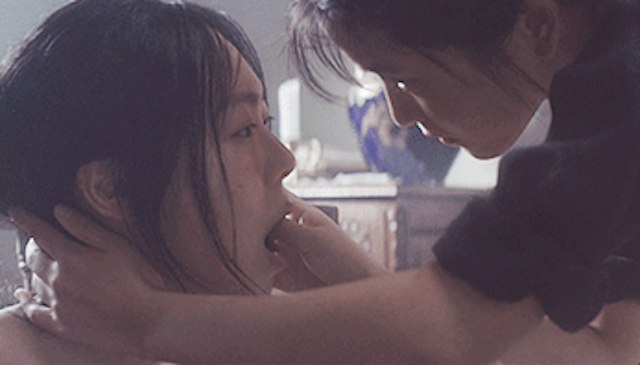Like the British imperialistic rule of India, non-history enthusiasts often forget about the Japanese control of Korea that began in 1910 and culminated at the end of World War II. It is this unique backdrop that punctuates the tenth film directed by Park Chan-wook (though, yes, he’s partaken in writing and producing a number of others), The Handmaiden–arguably bearing some feminist similarities to Margaret Atwood’s The Handmaid’s Tale. And, indeed, Chan-wook’s decision to re-work the source material (adapted from Sarah Waters’ porn-tinged titled Fingersmith) from the Victorian era to a time period resonant with his own culture only strengthens the narrative and his affinity with the screenplay and bringing it to life.
As the film opens with Sook-hee (Kim Tae-ri) departing for the lavish home of Japanese heiress Lady Hideko (Kim Min-hee), a number of women holding babies watch her depart in the rain, with one of them decrying, “It should have been me!” Sook-hee’s longstanding familiarity with thievery and the skill of the con stems from growing up in a family of swindlers, who only raise Korean babies to sell to Japanese people. This is, naturally, how another conman operating under the false name Count Fujiwara (Ha Jung-woo) comes into their lives, requesting that one of their ilk help him dupe Lady Hideko into accepting his marriage proposal so that he can soon after declare her mad, admit her to a mental institution and keep her fortune for himself.
More than just a statement on the lengths that money will drive a person to go to, The Handmaiden is about the transformation of lust into love and subsequently die-hard loyalty. Plus, it bears a similar plot twist structure to Laetitia Colombani’s 2002 He Loves Me…He Loves Me Not in that we’re given an unexpected twist in the middle, followed by a shift in perspectives that flips the entire script on the con that’s been being played.
But, of course, for many people, the structure is the least of where their interest in the film lies. Because it is a “Korean gothic lesbian revenge thriller,” one of the chief foundations of its allure is, well, all those scenes of lesbian sex. Though the attraction between Sook-hee and Lady Hideko is subtle at first, things escalate when Sook-hee gives her a bath and is inundated with the scent of rose petals paired with the sight of her breasts. When Lady Hideko complains of one of her teeth being too sharp as she sucks on a lollipop, Sook-hee runs into the other room and grabs a thimble. After putting it on her finger, she wields it sort of like a penis as she wears the sharpness down with repetitive motion while Lady Hideko’s mouth remains agape. It is this moment that cinches their amorousness toward one another.
As she begins to feel increasingly guilty about betraying Lady Hideko, Sook-hee makes overt attempts at preventing the success of Count Fujiwara’s progress in securing an engagement. When he chastises her privately for her behavior by placing her hand on his groin, she seethes, “Don’t ever put my hand near your tiny joke of a cock again.” Sook-hee’s fieriness, however, is still no match for the terrifying authority of the master of the house, Uncle Kouzuki (Cho Jin-woong). Part of the reason for Lady Hideko’s delicate state stems from being a slave to reading from her uncle’s robust collection of erotic novels, a collection he treats with more pride and care than he would his own progeny. Trained her whole life in the art of reading–this particular kind of reading–the demand to perform has shot her nerves and more than likely contributed toward her embitterment toward men, both her uncle and the ones who come to his home to listen to her.
Regardless of her fortune, Lady Hideko is little better than a captive servant in her own home. And so, she ends up taking Count Fujiwara up on his offer, even though it results in him delivering lines like, “A woman enjoys it more when she’s taken by force.” But Chan-wook is nothing if not a feminist, always rendering his female protagonists with the intelligence and patience to exact their due revenge (a book destroying scene that could rival Fahrenheit 451 proves that nobody fucks with Sook-hee’s woman). And while the romance between Sook-hee and Lady Hideko can seem doomed at times, the assertion, “Pain is a garment”–stated with the certainty of a philosophical tenant–is one of the most salient in The Handmaiden. It means it can be removed at any time. Like a thimble removes tooth sharpness.





















